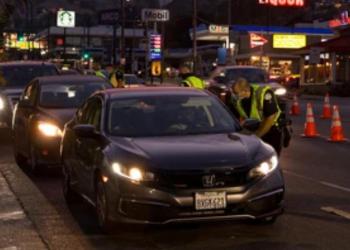
An officer asking to check a driver’s license at a DUI checkpoint is lawful
DUI checkpoints, so long as properly conducted, are constitutional. Requiring the driver of a car stopped at a DUI checkpoint to display his driver’s license is also constitutional. Using a minimal amount of physical force to arrest a driver with probable cause to believe he is driving without a valid driver’s license, at least when he has been verbally uncooperative up to that point, is lawful.
Plaintiff David Demarest, while visiting California from his home state of Vermont, drove up to a DUI (Driving while Under the Influence) checkpoint set up by officers of the Vallejo Police Department. The checkpoint was located near the intersection of Sonoma Blvd. and Solano Ave., a location chosen because of a significant number of DUI-related collisions occurring in the area. Having set up the checkpoint pursuant to an advance “DUI Checkpoint Operation Plan,” it was appropriately marked by signs reading: “DUI AND DRIVERS LICENSE CHECKPOINT AHEAD” and “HAVE YOUR DRIVERS LICENSE READY.” In addition to these signs, other safeguards were employed; i.e., “the area was coned off,” “traffic [was] slowed and directed to a single lane,” “there was portable lighting in the area,” and “police vehicles were at the checkpoint with [their] emergency lights on.”
A press release announcing the checkpoint was issued two days in advance and was reported on the website of a local newspaper. Under the prearranged checkpoint plan, a “neutral formula” was used under which “all vehicles will be stopped unless the backup exceeds 5 minutes,” in which case “all vehicles will be waived through until the backup is cleared.” At the checkpoint, which was operated from approximately 6:00 PM until midnight on the evening of September 26, 2020, officers were to “screen drivers for DUI, verify they have a (driver’s) license, and provide educational material in the form of a handout.”
Although it was contemplated that driver’s licenses were to be checked, it was undisputed that the checkpoint’s “purpose . . . was to remove intoxicated drivers from the road and to deter intoxicated driving.” “Removing unlicensed drivers from the road and deterring unlicensed driving was not a purpose of the [c]heckpoint.” At about 7:15 p.m., Demarest approached the checkpoint and was signaled to proceed up to Officer Jodi Brown, which he did. Officer Brown asked to see his driver’s license. Ignoring this request, Demarest asked if he could continue on his way. Officer Brown responded by asking for his license a second time. Apparently feeling he knew the law better than Officer Brown (being from Vermont and all), Demarest asked her whether she had any cause or reasonable suspicion to stop him. Officer Brown declined to take the bait or debate the issue and simply told him that if he did not provide his license as requested he would be arrested. When Demarest continued to ignore Officer Brown’s request for his license, the officer opened the door to his car, grabbed his left wrist, and pulled him from the vehicle. She then handcuffed him, telling him to stop resisting and that he was under arrest.
Once his driver’s license was located, it was determined that his license was valid and there were no outstanding warrants. The officers declined to give Demarest a breath test when he requested one, telling him “[t]hat’s not what this is about.” Demarest asked to speak to a supervisor. Officer Herman Robinson (apparently in charge of the DUI checkpoint) came to speak with him. Demarest complained to him that he had done nothing wrong and had only exercised his rights under the Fourth Amendment. Officer Robinson simply responded with words to the effect that: “You win more bees with honey than vinegar.” Demarest was booked into jail.
Charged in state court with resisting arrest (P.C. § 148(a)) and possession of a concealed dirk or dagger (P.C. § § 21310; for a knife found during booking on a rope he wore around his neck and which was missed when initially patted down for weapons), he later agreed to participate in a diversion program upon successful completion of which all charges were dismissed. Bound and determined to get the last word, Demarest sued Officer Brown and the City of Vallejo in federal court pursuant to 42 U.S.C. § 1983, claiming false arrest and the use of excessive force, arguing that Officer Brown had exacerbated his pre-existing back pain by 10 to 15 percent. The federal district court granted the civil defendants’ motion for summary judgment, dismissing the case. Demarest appealed.





